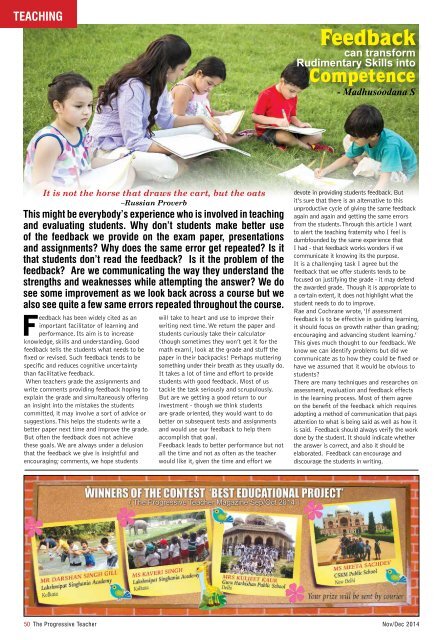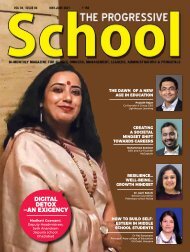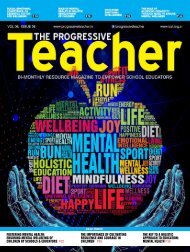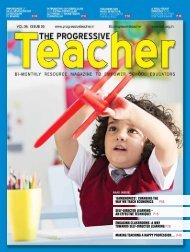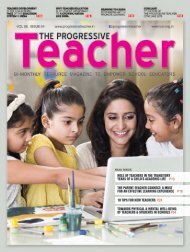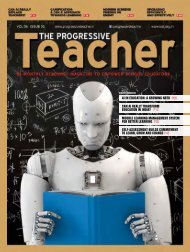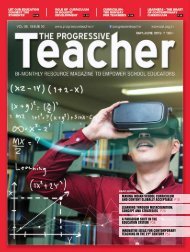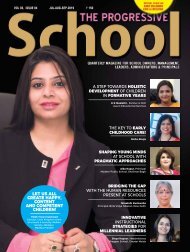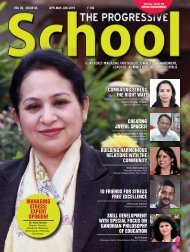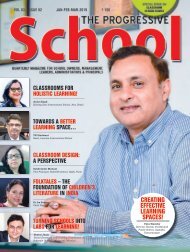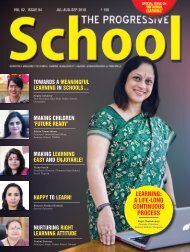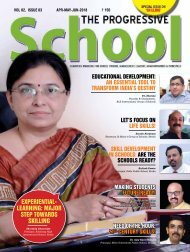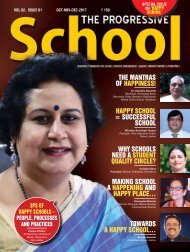The Progressive Teacher Vol 01 Issue 05
This issue of The Progressive Teacher focuses on "Celebrating Books and Reading". The magazine provides guidance to the teachers by their peers and school leaders for tackling challenges with innovative ideas. Hope you enjoy the read!
This issue of The Progressive Teacher focuses on "Celebrating Books and Reading". The magazine provides guidance to the teachers by their peers and school leaders for tackling challenges with innovative ideas. Hope you enjoy the read!
You also want an ePaper? Increase the reach of your titles
YUMPU automatically turns print PDFs into web optimized ePapers that Google loves.
teaching<br />
Feedback<br />
can transform<br />
Rudimentary Skills into<br />
Competence<br />
- Madhusoodana S<br />
It is not the horse that draws the cart, but the oats<br />
–Russian Proverb<br />
This might be everybody’s experience who is involved in teaching<br />
and evaluating students. Why don’t students make better use<br />
of the feedback we provide on the exam paper, presentations<br />
and assignments? Why does the same error get repeated? Is it<br />
that students don’t read the feedback? Is it the problem of the<br />
feedback? Are we communicating the way they understand the<br />
strengths and weaknesses while attempting the answer? We do<br />
see some improvement as we look back across a course but we<br />
also see quite a few same errors repeated throughout the course.<br />
Feedback has been widely cited as an<br />
important facilitator of learning and<br />
performance. Its aim is to increase<br />
knowledge, skills and understanding. Good<br />
feedback tells the students what needs to be<br />
fixed or revised. Such feedback tends to be<br />
specific and reduces cognitive uncertainty<br />
than facilitative feedback.<br />
When teachers grade the assignments and<br />
write comments providing feedback hoping to<br />
explain the grade and simultaneously offering<br />
an insight into the mistakes the students<br />
committed, it may involve a sort of advice or<br />
suggestions. This helps the students write a<br />
better paper next time and improve the grade.<br />
But often the feedback does not achieve<br />
these goals. We are always under a delusion<br />
that the feedback we give is insightful and<br />
encouraging; comments, we hope students<br />
will take to heart and use to improve their<br />
writing next time. We return the paper and<br />
students curiously take their calculator<br />
(though sometimes they won’t get it for the<br />
math exam), look at the grade and stuff the<br />
paper in their backpacks! Perhaps muttering<br />
something under their breath as they usually do.<br />
It takes a lot of time and effort to provide<br />
students with good feedback. Most of us<br />
tackle the task seriously and scrupulously.<br />
But are we getting a good return to our<br />
investment - though we think students<br />
are grade oriented, they would want to do<br />
better on subsequent tests and assignments<br />
and would use our feedback to help them<br />
accomplish that goal.<br />
Feedback leads to better performance but not<br />
all the time and not as often as the teacher<br />
would like it, given the time and effort we<br />
devote in providing students feedback. But<br />
it’s sure that there is an alternative to this<br />
unproductive cycle of giving the same feedback<br />
again and again and getting the same errors<br />
from the students. Through this article I want<br />
to alert the teaching fraternity who I feel is<br />
dumbfounded by the same experience that<br />
I had - that feedback works wonders if we<br />
communicate it knowing its the purpose.<br />
It is a challenging task I agree but the<br />
feedback that we offer students tends to be<br />
focused on justifying the grade - it may defend<br />
the awarded grade. Though it is appropriate to<br />
a certain extent, it does not highlight what the<br />
student needs to do to improve.<br />
Rae and Cochrane wrote, ‘If assessment<br />
feedback is to be effective in guiding learning,<br />
it should focus on growth rather than grading;<br />
encouraging and advancing student learning.’<br />
This gives much thought to our feedback. We<br />
know we can identify problems but did we<br />
communicate as to how they could be fixed or<br />
have we assumed that it would be obvious to<br />
students?<br />
<strong>The</strong>re are many techniques and researches on<br />
assessment, evaluation and feedback effects<br />
in the learning process. Most of them agree<br />
on the benefit of the feedback which requires<br />
adopting a method of communication that pays<br />
attention to what is being said as well as how it<br />
is said. Feedback should always verify the work<br />
done by the student. It should indicate whether<br />
the answer is correct, and also it should be<br />
elaborated. Feedback can encourage and<br />
discourage the students in writing.<br />
50 <strong>The</strong> <strong>Progressive</strong> <strong>Teacher</strong> Nov/Dec 2<strong>01</strong>4


